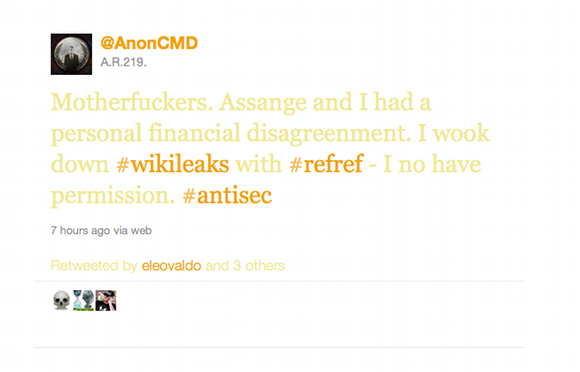Comment One of the unanswered questions arising from the August riots is whether the government needs new powers to block the use of Twitter, Facebook and other social media which were used to organise the disturbances.
Prime Minister David Cameron suggested, in the immediate aftermath of the rioting, that blocking the use of social networking communications was a policy option that was to be urgently discussed with telecommunications operators (and then implemented as a priority).

So when the Home Office says (as it has done) that no new powers are needed, then it follows that either no new powers are needed (ie, the government already has the power to block social networking communications) or the politicians have quietly gone off the idea (and have decided not to say so).
Hack the RIPA
Assuming it is not the latter, one’s first instinct is to look at the Regulation of Investigatory Powers Act (RIPA) as the source of any power to block communications. This Act states (in section 8 of RIPA) that to lawfully authorise interception, a signed warrant from the Home Secretary is required and that this warrant has to “name or describe either:
Clearly “the one person” description in paragraph (a) can’t work if there are hundreds of unknown individuals engaged in a riot, while the limitation to “a single set of premises” of paragraph (b) was not really intended to be stretched to lawfully describe something like “all premises in N17” (the post code of the Tottenham area).
Also, RIPA uses the word “interception”. So do provisions to allow the authorities to intercept and study the content of communications between the “bad guys” (the intent behind RIPA) extend to the “blocking” of all communications to thousands of individuals (ie, including the “good guys”) where the content of the communications is not studied at all? I am not sure it does.
For these reasons, I do not think that RIPA as currently constructed can be reliably used in riot situations as a lawful basis that blocks communications in the area of a riot. So where are the powers to block?
Uncivil disobedience
If I was having a bet, I think ministers might be considering the powers in the Civil Contingencies Act 2004. This is because the definition of an “emergency” – which is required to trigger use of the Act’s draconian powers – clearly includes a riot, as a riot could cause “serious damage” to human welfare, to property and threaten lives.
Additionally, where the issue is “urgent”, then the Civil Contingencies Act’s powers can be exercised by ministers without resort to Parliament. Although “urgency” is understandable in times of a crisis, these urgency provisions also minimise Parliamentary scrutiny of their use at the critical time that the powers are exercised.
One issue that is unresolved is whether “rioting” can be given a “national security” label. For example, section 94 of the Telecommunications Act 1984 allows the Secretary of State to “give to that person” (eg, a telecommunications operator) “such directions of a general character as appear to the Secretary of State to be necessary in the interests of national security”.
However, as public utterances of ministers have always addressed the August riots in terms of “criminality”, then I suggest that “national security” powers really cannot be used to justify blocking of networking sites. If national security powers were to be used, then this would be wholly at odds with all the current political discourse.
Politicians want to keep a finger on the mute button
Other powers are in Part III of the Police Act 1997; this allows the police to interfere with “wireless telegraphy” if interference is authorised by a chief constable. However, if chief constables have the power, then this would exclude the politicians, who in the August riots clearly wanted to manage the police’s response to the riots. The Civil Contingencies Act, by contrast, avoids this problem; it gives the authorising powers to ministers and not the police – another reason why I think that the powers in this Act are preferred.
When emergency powers are used individual rights are often in their greatest peril of disappearing
All sorts of complicated, practical issues would still remain. For instance, if you block communications in an area, you will be blocking communications for everybody. So if you block messages saying “let’s have a riot” you also block messages asking “Are you safe?”. Also, there are also difficulties about defining when rioting is taking place and when the powers are used. For instance, what is the difference between “a riot” and Friday-night pub-chucking-out time in some of our city centres? Not much, I would argue.
In summary, the “riots” have thrown up all the age-old questions in the context of mass interference to communications systems used by every citizen. Do such powers exist already? When are they used? Who should exercise these powers? What are the checks and balances in relation to the exercise of these powers?
These important questions need an answer from our political masters. One can’t have the “riots” being used to justify the building a system of extensive blocking of ALL communications without equal thought being given to the building of a reliable counter-balance that protects from the misuse of those powers.
This is especially the case if the powers of the Civil Contingencies Act 2004 are being contemplated as the vehicle to make such blocking lawful. After all, history tells us that it is in a time when emergency powers are used, that individual rights are often in their greatest peril of disappearing.
References: To understand the issues associated with the Civil Contingencies Act, see Liberty’s briefing on the second reading of the Bill, first published in 2004.
This story originally appeared at HAWKTALK, the blog of Amberhawk Training Ltd.
Article source: http://go.theregister.com/feed/www.theregister.co.uk/2011/09/02/which_law_legitimises_the_blocking_of_communications/
